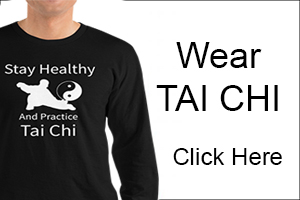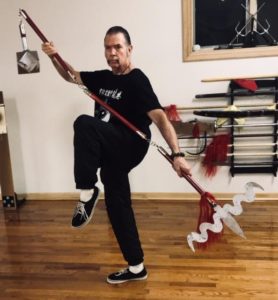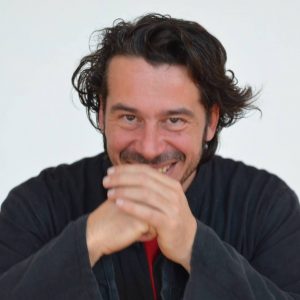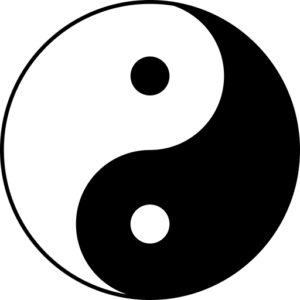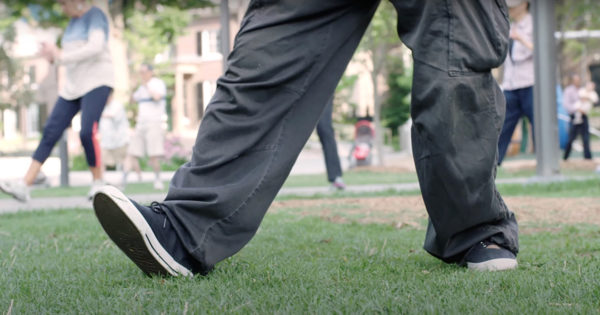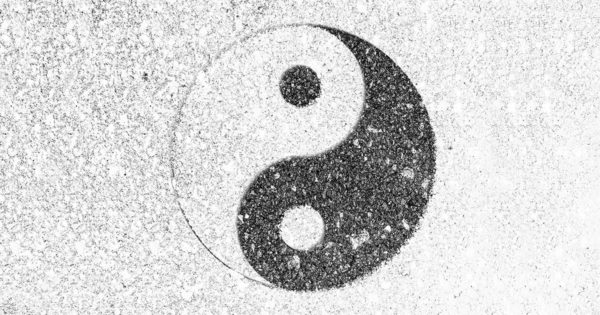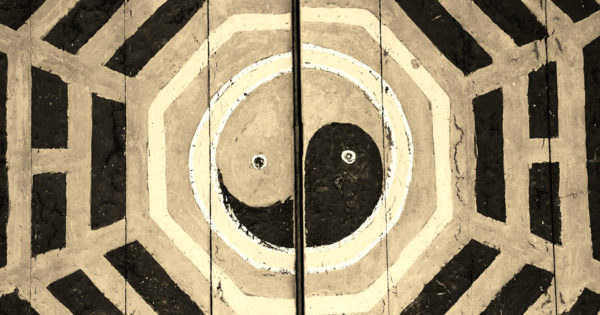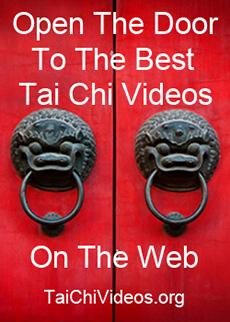Slanted FlyingJournal of Tai Chi Chuan
Philosophy
The Cultural (Wen) And The Martial (Wu) Aspect In Taijiquan
Wen and wu in Chinese culture
Wen in its original, literal meaning refers to a zigzag, to a drawing or to pattern in general. Thus the term is applied to decorations on bronzes from the Zhou period. On the wider meaning of the term, Smith writes, “Wen conveys a wide range of meanings, most of which derive from the basic sense of ‘makings’ or ‘patterns’. Wen refers narrowly to Chinese writing and literature, but more broadly to a whole constellation of distinctive cultural attributes – art, music, ritual and so on – each which, like literature, had an expressly moral component. Wen was the measure of a Confucian gentleman in traditional China, the mark of true ‘civilization’.” (Smith p. 2)
That places wen in opposition to wu, the martial. The ideogram for wu covers the concepts ‘military’, ’martial’, ‘belligerent’, ‘violent’ and ‘fierce’, ‘vehement’. Significantly, it follows that wu can denote both man-to-man combat and a battle of many against many and so incorporates an association of war. The twin concepts wen and wu and so, the relationship between the cultural and the martial, or between the civil and the military, is a topic that has always been a matter of fervent debate in China. Given this importance it has left its mark in the language itself. Table 1 gives an impression of the use of wen and wu in word pairs.
 In China’s cultural history, the twin concepts of wen and wu figure as early as in the names of the first two kings of the Zhou Dynasty. King Wen is regarded as the dynasty’s founder and is lauded for his cultural achievements. King Wu, on the other hand, is said to have established the Zhou Dynasty once and for all through his military successes. The Analects of Confucius, for example, tell us that “the way of the kings Wen and Wu has never utterly fallen to the ground. Among men, those of great understanding have recorded the major principles of this Way and those of less understanding have recorded the minor principles. So there is no one who has not access to the Way of Wen and Wu.” (The Analects p. 225)
In China’s cultural history, the twin concepts of wen and wu figure as early as in the names of the first two kings of the Zhou Dynasty. King Wen is regarded as the dynasty’s founder and is lauded for his cultural achievements. King Wu, on the other hand, is said to have established the Zhou Dynasty once and for all through his military successes. The Analects of Confucius, for example, tell us that “the way of the kings Wen and Wu has never utterly fallen to the ground. Among men, those of great understanding have recorded the major principles of this Way and those of less understanding have recorded the minor principles. So there is no one who has not access to the Way of Wen and Wu.” (The Analects p. 225)
Although both King Wen and King Wu are glorified, Confucianism places wen before wu. The civil always controls the military and the cultural is in all cases preferable to the martial. In Confucianism the rule of moderation and the medium is one of the main precepts. Martial altercation is an extreme to be avoided. This is not to say, however, that martial readiness is an unknown quantity in Confucianism. Thus the six arts (liuyi) of the Confucian scholar included archery and horsemanship alongside command of the rituals, music, calligraphy and arithmetic. “The popular image of a Confucian scholar as an over-refined and effeminate bookworm came into being centuries later, and is any case not true of all Confucian scholars even in later periods.” (Liu James J. Y. p. 8).
In fact, things military have proved to be an astonishingly intense, continual preoccupation throughout Chinese Philosophy. “It is a seldom-advertised fact that many if not most of the classical Chinese philosophical works contain lengthy treatises on military thought: the Master Mo, Master Xun, Master Guan, the Book of Lord Shang, the Spring and Autumn Annals of Master Lü, the Master of Huainan, and so on. In addition, other central texts such as the Analects, Mencius, Laozi, Master Han Fei, and the recently recovered Silk Manuscripts of the Yellow Emperor contain extended statements on military thoughts.” (Ames p. 39)
In China’s classical period there were two groups for whom martial issues were a particular concern. The first were the strategists. They would advise princes and kings in matters of war. Yet even given their profession, war for them, too, was only ever a last resort and to be avoided as far possible. It always represented a high risk and even in the case of a victorious outcome, devoured resources in great quantity.
One of the greatest of these strategists, Sunzi, wrote, “War is a vital matter of state. It is the field on which life or death is determined and the road that leads to either survival or ruin, and must be examined with the greatest care.” (Ames p. 103). This stands in stark contrast to the attitude of the knights errant or youxia. Politics would not rouse them; what they rose to with fervor was man-to-man combat. Whenever justice and renown were at stake, the sword was drawn. This made the knight-errant the incarnation of the martial.
What amounted to an anarchist desire for independence in these wandering knights also characterized the Daoists; but the latter favored the principle of non-action (wuwei) and of absolute spiritual liberty, whereas the knight-errants found sufficient fulfillment in social freedom. Thus Laozi Daoism would reject both the cultural and the martial principle. With reference to the cultural, Laozi verse 18 narrates:
It was when the Great Way declined
that human kindness and morality arose;
It was when intelligence and knowledge appeared
That the Great Artifice began.
It was when the six near ones were no longer at peace
that there was talk of ‘dutiful sons’;
Nor till fatherland was dark with strife
did we hear of ‘loyal slaves’. (Laozi, p 37)
And, regarding the martial (Laozi Verse 31):
Fine weapons are none the less ill-omened things. […] And he who delights in the slaughter of men will never get what he looks for out of those that dwell under heaven. A host that has slain men is received with grief and mourning; he that has conquered in battle is received with rites of mourning.
(Laozi, p 63)
One should picture the early Daoists as recluses and independent farmers who eschewed social contact and thought that everyone could coexist peaceably if they were only left alone and without the constraints of a government or other kinds of social organization. Even so, Laozi-Daoism does not entirely exclude military power. But how is it to be applied? Liu writes, “The answer can be found in the classic Daoist writings, which develop an original and remarkably wise way of dealing with the problems and dangers of military confrontations, an approach that follows naturally from basic Daoist principles.“ (Liu Da p. 39). Such principles are reflected for example in verse 30 of the Laozi:
Therefore, a good general effects his purpose and then stops; he does not take further advantage of his victory. Fulfills his purpose and does not glory in what he has done. Fulfills his purpose and does not boast of what he has done. Fulfills his purpose, but takes no pride in what he has done. Fulfills his purpose, but only as a step that could not be avoided. Fulfills his purpose, but without violence. (Laozi, p 61)
In Huanglao Daoism, which developed later, wen and wu are encountered as a mutually complementary principle.- “Heaven has a season for life and death, states have policies for life and death. To rely on Heaven’s seasons of life to nourish the living is called wen (Patterning); to rely on Heaven’s season of killing to attack the dying is called Wu (Martiality). When both Wen, [patterning] and Wu [Martiality] are carried out, then the world will follow and obey.” (Yates p. 63)
The field of tension acknowledged in classical Chinese philosophy as wen and wu ultimately finds expression in imperial Chinese society itself. Wen is accorded primacy, and as far possible, the civil principle is to prevail. For emergencies only, there is wu, the military. All of society is structured according to this ideal. There is a ruling bureaucratic state which controls the military sphere. Glorification of war was unknown and the attitude to the army was based on three premises: “… firstly, a low esteem of all things military: ‘hao ren bu dang bing’, ‘a good person will not be a soldier,’ a saying familiar to all Chinese has it.
From a Confucian point of view the soldier performs a function as dubious as that of criminal law: it is a practical necessity, but it is only grudgingly acknowledged as it is an indication of the failure of the Confucian moral code. Popular tradition has its notorious generals and at their head, Guan Yu, later elevated to the status of God of War, but even he distinguished himself less by heroism than by his pronounced shrewdness. It is no coincidence that he his also revered as the tutelary god of traders. To foil one’s opponent, political means are preferred to military, for example by forming ‘alliance with the far away in order to combat what is close by’ in placating one’s foe with gifts or in recourse to the tribute system to ‘civilize’ the ‘barbarians’.
In such concepts a second tradition is already implicit, namely that of the strict monitoring of the army (wu) by the civil mandarinate (wen). Throughout the course of history, it was wen elements that proved to be both the state-upholding and the integrative forces, whereas, whenever the armed forces gained control, disarray was in the offing.
A third notion had to do with the ‘educational’ uses of the army. Territorial gain or the securing or protecting of economic advantages were exceptions as far as the chief aims of military action were concerned. Rather, their usual purpose was ‘punitive and educational campaigns’ against ‘disobedient’ and insubordinate neighbors; which, in passing, was still the view in the campaigns against India in 1962 and Vietnam in 1979.” (Weggel p. 139)

